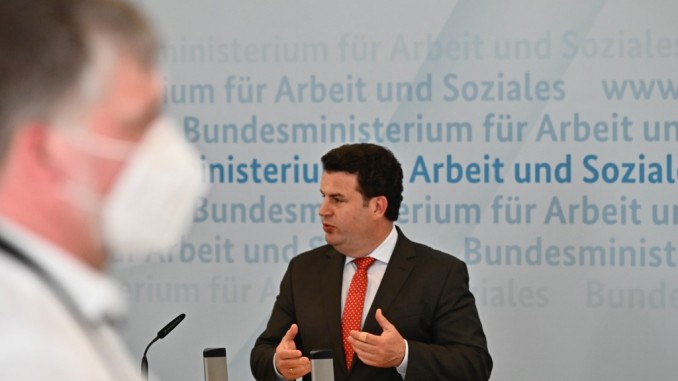
The following is a report from an activist based in Berlin, Germany
Background:
In Germany there is a labor law regulating working hours. The most important thing to understand about this law is that it allows for 8-10 hour shifts without breaks up to 48 hours per week. If an 8-10 hour shift is completed without breaks, the law mandates there must be a rest period of 11 hours between the end of the shift and the beginning of the next shift. However, since the outbreak of the COVID-19 pandemic, there have been many exceptions to this law that have resulted in deteriorating working conditions for many.
To justify this, there is language in certain collective bargaining agreements that regulate and allow for extended work time. Such collective agreements are common in the transportation sector, hospitals and more, where12-hour shifts are possible with certain exceptions. For example, the national German Train Driver Union (GDL) – a roughly 34,000 member union representing 80% of train drivers in both Germany’s national and private train systems, as well as train conductors – has language in their collective bargaining agreement allowing for 12-hour shifts if there is a “regular and substantial amount of willingness” within the workforce (at least 30%) to work this overtime. Collective bargaining agreements also allow 12-hour shifts for doctors at hospitals.
What’s new since the outbreak?
In short, in certain industries, 12-hour shifts with a maximum of 60 hours per week will be permitted for a limited time in the future. The unions have gone along with this thus far and one can assume they are ready to “adjust” to these stricter collective bargaining rules for the foreseeable future (at least the train drivers union has already done this for some private railways).
How has this looked in detail?
Many local authorities have issued additional exemptions for their respective areas since mid-March.
Berlin, for example, issued a general decree on March 18 allowing for 12 hour work shifts in certain “essential” industries. The following activities / sectors were included:
- Key Logistical Sectors for Essential Items: Production, delivery, loading and unloading and clearing of everyday goods (e.g. hygiene articles, food), medical devices, medicine, as well as goods related to infection prevention such as personal protective equipment, disinfectants, etc.
- Medical treatment and other forms of medical care
- Emergency and paramedic services, as well as the Fire Department
- Police
- Hospitals and other facilities for the treatment, care and care of people;
- Transport services
- Energy and water supply companies as well as waste and sewage disposal companies
In all these sectors, it should be noted that maximum 12 hours shifts are allowed, with a mandatory rest period of 11 hours before the next shift.
In addition to this state of exception announced in Berlin, the Federal Ministry of Labor issued an ordinance on April 7, also permitting the extension of working hours. This regulation and the local states of exception exist side by side, but they are not always identical.
For certain essential activities / industries, this federal ordinance states that working hours may be extended to 12 hours a day with a maximum of 60 hours per week. “In certain extraordinary cases of exception,” the law says, 60 hours may even be exceeded if the extension is “absolutely necessary” and the COVID-19 pandemic is the cause! In addition, the rest period between the end of a worker’s shift and the start of a next shift can be reduced to 9 hours in this case!
This ordinance at the federal level applies to all the same industries and found in the local Berlin ordinance; however, (so far) it does not apply to the transport sector across the country. This regulation is set to be in place until June 30.
It’s all pretty complex in details. The pressure on the works councils1 (non-German readers: see explanation below for what a works council is) on site is certainly very strong now to adjust the shift plans. In any case, these regulations give companies greater leeway than before to extend and intensify working conditions, and they are sure to take advantage of it.
The press has also reported that the university hospital at the University of Essen (industrial city in West Germany) wants to introduce 12.5 hour shifts for workers. Their council representing hospital employees refused this dictate from management. Instead, they asked for improvements in protective measures, hazard pay, ensuring childcare and more:
What I do not know is to what extent unions are willing to adjust collective bargaining agreements around how work and shifts are scheduled, that is, to worsen them. With the private railways, the German Train Drivers Union (GDL) was ready to change the collective agreements for the train drivers – with regard to the ability to plan (i.e. when the working days and shifts will be announced). But the GDL is certainly not the only union. And works councils within the regional subsidiaries of Germany’s national train system, Deutsche Bahn Regio, even explicitly call for such changes in shift planning! I haven’t heard any annoyance from the train drivers I know. Long shifts in this industry have been normalized and it seems to me that in practice the law has not been observed anyway, so these new regulations – at least for the railways – are probably more an adaptation to reality.
To conclude, this is an update to how the coronavirus has influenced German labor law and the conditions of workers. After this precedent has been set, companies will certainly exert pressure to achieve a general and permanent change to the labor law governing work hours.
1In Germany, in many workplaces there are what are called Betriebsräte, which is roughly translated to “work councils.” They are an elected leadership of workers within a company that is supposed to represent the interests of workers in negotiating with management over certain terms of work. They are “shop-floor” organizations within companies and are different than trade unions, which are organized nationally by different sectors in Germany. This may be a foreign idea for some as similar structures don’t necessarily exist in countries such the United States, where similar work may be taken up by a network of union activists at a particular workplace.
Featured image credit: Tobias SCHWARZ / AFP




